Rosehips are small, amazing “fruits” with incredible health benefits that few people know about.
They come from the same plant as the beautiful rose blossoms so many love but completely outshine their counterparts when it comes to health-boosting properties. In fact, rosehips have shone in traditional medicine for hundreds (and likely thousands) of years and are just now starting to get the attention they deserve from research.
Read on to learn about the numerous way rosehips support your body and the outstanding anti-aging power they have for your skin.
What Are Rosehips? An Overlooked Gem
As mentioned, rosehips come from the very familiar rose plant (Rosa sp.). They form after the flowers die and can be seen clearly when the petals drop.
Rosehips are usually ruby red in color and change to a duller red-orange hue as they dry. Though often called the fruit of the rose plant, rosehips are technically known as a “false fruit” or “pseudo-fruit”. Nevertheless, they are entirely edible with a sharp, tangy, and somewhat sweet flavor.
Many different types of rose bushes produce rosehips, although not all. The pseudo-fruits are most commonly harvested (commercially) from Rosa canina, the dog rose bush.
And while many people may consider the flowers to be the most valuable part of the plant, rosehips are packed with a large amount of vitamins and antioxidants that make them nutritionally superior.
Important Note: If you know anything about roses (or have tried growing them yourself), you may know that roses often see heavy pesticide use because there are numerous pests that love to attack them. This makes it critical to always look for certified organic rosehips— no matter which type of preparation you choose to try.
Rosehips Around the World

Many cultures throughout history have been well aware of the health benefits of rosehips.
In traditional Chinese medicine, they are called jin ying zi and considered a health tonic, especially for the kidneys, digestion, and immune system. Rosehips have also played a big role in the herbal tradition of Scandinavian countries, perhaps even as far back as the Vikings.
During World War II, this tiny pseudo-fruit even became a superstar in Great Britain.
Because of a shortage of citrus fruits due to import restrictions, the government was scrambling to find another source of vitamin C to prevent illness. It was discovered that rosehips would fit the bill perfectly, and the Ministry of Health called for a huge collection campaign.
Once collected, the rosehips were turned into syrup and distributed, starting with children, the sick, and the elderly.
Top Health Benefits of Rosehips
Packed Full of Immune-Boosting Vitamin C
Rosehips are a little known source of vitamin C, packing in more of this nutrient than most fruits and vegetables.
Some species have as much as 112-360 mg. of vitamin C per 100 grams of fruit pulp. (Compare that to oranges, which only have about 53 mg. of vitamin C per 100 grams of fruit!)
There are numerous benefits of vitamin C for your body, but one of the most notable is immune support.
If you’re short on vitamin C, research has shown that your body may become more susceptible to illness, especially respiratory infections. On the flip side, adding more vitamin C to your diet when you are sick may help shorten the duration of a cold and other respiratory illnesses.
Rich in Antioxidants that Fight Inflammation (and Possibly Cancer)

Vitamin C is a powerful antioxidant in its own right, but rosehips are also full of other antioxidants like polyphenols, flavonoids, carotenoids, and vitamin E.
Antioxidants have many protective roles to play in your body. One of the biggest is helping to lower chronic inflammation, which can contribute to a wide range of chronic diseases.
Free radicals are thought to be one of the main generators of chronic inflammation. They are unstable molecules that “attack” and damage other molecules and tissues in your body, resulting in injury and inflammation. By neutralizing free radicals, antioxidants are able to combat inflammation and may lower your risk of many age-related diseases.
In addition to generally defending you from disease, lab studies have shown that rosehip extract also has the potential to fight breast cancer cells.
May Ease Arthritis (and Other Types of Pain)
Studies show that there could be significant health benefits of rosehips for arthritis— namely, easing pain and inflammation.
Rosehips contain compounds known as galactolipids. Galactolipids make up part of the cell membrane of certain plants and are being researched because of their powerful anti-inflammatory properties.
As multiple studies have revealed, it’s likely that these specific plant compounds play a large role in easing arthritis symptoms.
In one clinical trial, rosehip powder taken twice daily for 4 months led to a reduction of osteoarthritis symptoms in participants. Nearly 65% of the patients had reduced pain, and hip joint mobility improved as well. Notably, rosehip did not have the side effects normally associated with NSAIDs and aspirin.
Given these findings, it’s likely that rosehips can help with other types of pain as well, but studies haven’t yet been undertaken.
Excellent for Heart Health

Rosehips offer support for heart health in several ways, particularly by their vitamin C and antioxidant content.
You may not know this, but vitamin C is a critical nutrient for a healthy heart. Some research has linked an insufficiency of vitamin C to a greater risk of dying from heart disease. Other studies indicate that adding more vitamin C to your diet can improve risk factors like cholesterol and blood triglycerides.
An antioxidant-rich diet is also key for your heart because it helps to keep inflammation in check. Flavonoids, a type of antioxidant rosehips are full of, can even help to reduce blood pressure and improve blood flow to the heart.
One small study has offered confirmation for all of this. It found that consuming 40 grams of rosehip powder a day led to lower blood pressure as well as a decrease in LDL (bad) and total cholesterol levels.
Protective of Gut Health (+ A Prebiotic)
Protecting gut health could be called one of the most traditional health benefits of rosehips.
These pseudo-fruits have been used for centuries to treat diarrhea, stomach ulcers, and other GI ailments. Now, research is emerging in support of this traditional use for rosehips.
Perhaps most notably, one study found that rosehip extract had “significant antidiarrhoeal activity” that was comparable to a conventional anti-diarrhea medication known as diphenoxylate (brand name Lomotil). It has also exhibited an anti-ulcer effect, though human research is lacking.
In other good news, rosehips are particularly rich in pectin, a polysaccharide that acts as a prebiotic to feed the good bacteria in your gut. Alongside probiotics, prebiotics are crucial for a healthy digestive system (and overall health!).
May Boost Metabolism & Improve Weight Loss

A few studies have shown that rosehip extract can boost fat-burning and decrease body weight.
In a key clinical trial from 2015, participants took either 100 mg of rosehip extract or a placebo every day for 12 weeks. The results were quite impressive. Total body fat and body mass index decreased significantly in the rosehip group. Stomach fat, in particular, was also significantly decreased for those who took the extract.
While the study was very small, these results were achieved with no dietary intervention.
Added to a healthy diet, exercise, and other holistic practices, rosehips could do even more for metabolism and possibly aid weight loss or weight management!
Top Ways to Take Rosehips
To get the most health benefits out of rosehips, it’s first of all key to look for organic rosehips or a rosehip supplement. As mentioned, non-organic rose plants typically receive heavy amounts of pesticides, and you do not want these chemicals in your body.
Two of the top ways to take rosehips are as a tea or a powdered extract.
To make the tea, simply use 1-2 tablespoons of organic rosehips and hot water. The longer you steep your tea, the stronger it will be. Rosehip tea is deliciously tart and packed full of nutrients, although it does lack the fiber of the whole fruits.
For more fiber that may benefit cholesterol and digestion, look for an organic rosehip powder supplement.
And keep reading for a third truly outstanding way to use rosehips…
Incredible Anti-Aging Benefits of Rosehips for Skin
Boosts Collagen to Fight the Appearance of Wrinkles

Collagen is an extremely important anti-aging skin protein. It plays a major role in keeping your skin firm, thick, and plump, which in turn fends off signs of aging like wrinkles, crow’s feet, etc.
Unfortunately, collagen production starts to decline in your body— starting as early as age 18!
The result is that most people notice their skin starting to look visibly older around age 30 and sometimes sooner. To stop (and reverse) this downward trend, your skin needs to be “fed” ingredients that will stimulate collagen production.
Research has shown that vitamin C is one of the best catalysts for collagen synthesis— and rosehips are, of course, packed full of it.
Simply consuming rosehip powder has been shown to improve the appearance of wrinkles. Studies also consistently show that applying vitamin C topically can boost collagen, so you’ll want to make use of rosehips in your skincare as well.
Helps Protect Against Photoaging
Photoaging refers to the appearance of dark spots, wrinkles, thinning skin, etc. that come from too much UV exposure. Basically, this type of cellular damage accelerates the aging process and can make your skin look prematurely old.
Fortunately, there are some powerful health benefits of rosehips against this type of damage due to their antioxidant content.
Antioxidants have proven to be some of the best protective agents your skin has to prevent UV damage. Vitamin C and vitamin E, in particular, work synergistically to provide greater photoprotection than either does alone. (And rosehips contain both of these vitamin antioxidants.)
In fact, rosehip extract has specifically shown an ability to protect against UVB-induced photoaging, which means it can help your skin look younger for longer.
Nourishes and Hydrates Skin
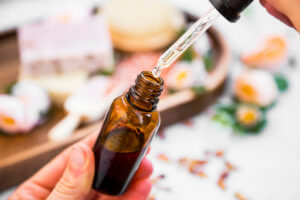
Rosehip seed oil (pressed from the seeds of rosehips) is an excellent moisturizer for dry or mature skin types.
It contains several fatty acids— including linoleic acid, linolenic acid, and oleic acid— that are deeply nourishing for your skin and help to lock in hydration. These fatty acids help support your skin barrier (something else that can degrade with age), essentially preventing water from evaporating too quickly.
Interestingly, studies have also shown that rosehips can improve skin moisture when consumed as well as applied. A good case for utilizing these amazing pseudo-fruits more than one way!
Rejuvenates Skin with Beta Carotene (Vitamin A)
Vitamin A is a well-known anti-aging nutrient, especially for you skin.
Like other antioxidants, it helps protect your skin from UV damage, slowing the process of skin aging. Vitamin A can also help to reduce the appearance of wrinkles, age spots, hyperpigmentation, and other signs of aging when applied topically. (One of the reasons retinol products are so popular.)
Rosehips contain vitamin A in the form of beta carotene, which is a powerful carotenoid (antioxidant).
Not only is beta carotene a precursor to vitamin A, it has also demonstrated its own benefits for photoprotection, improving facial wrinkles, and improving elasticity.
Brightens Skin and Fades the Appearance of Hyperpigmentation
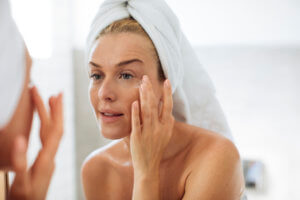
The vitamins in rosehips (and in rosehip oil) have major health benefits for restoring the appearance of youth to your skin.
Both vitamin A and vitamin C encourage skin cell turnover, which has the effect of making your skin look brighter, fresher, and more “glowing”.
Vitamin C is also known to help calm inflamed skin, and vitamin E (also abundant in rosehips) has its own significant anti-inflammatory effect.
This means that applying rosehip seed oil to your skin is an excellent way to calm the appearance of inflammation or redness, which has the added benefit of evening out your skin tone. There’s even indication that rosehip oil can help with scarring.
In addition, vitamins A, C, and E can all help fade the appearance of hyperpigmentation (age spots). Studies have also indicated that rosehip extract inhibits pigmentation, which means in may be able to help stop age spots before they form.
Softens Skin and Improves Elasticity
By providing much needed hydration and encouraging skin cell turnover, rosehips also help your skin to feel softer and look smoother and tighter.
Studies have also shown that using rosehips long-term can improve skin elasticity, which is a measure of how well your skin can “bounce back” after injury or being stretched. This is incredibly important for maintaining youthful-looking skin because loss of elasticity is a top reason for the appearance of wrinkles, saggy-looking skin, and so on!
Top Recommendation: Using Rosehips for Younger-Looking Skin
Consuming rosehips (as a tea or extract) will give you some health benefits for your skin, but rosehip seed oil is by far the superior choice for your skincare. Not only is it rich in vitamins and antioxidants, it also deeply nourishes and hydrates your skin.
As with any form of rosehips, look for organic rosehip oil to avoid harmful toxins. It’s lightweight enough to be applied to your skin as is, but it will be most effective when combined with other anti-aging ingredients.
With that in mind…
If you are in the market for a high-quality, effective eye cream, look into the Age-Defying Eye Cream from Purity Woods that contains organic rosehip seed oil and over 25 of nature’s other top ingredients for your most youthful-looking skin around eyes.
The outstanding benefits of rosehips are combined in this cream with elastin-boosting maple leaf extract, premier vitamin C ingredients, and rich moisturizers like organic mango butter. The entire formula is USDA Certified Organic and quickly erases the appearance of under-eye bags, dark circles, crow’s feet, etc.
Learn more about the Age-Defying Eye Cream here, and be sure to consume rosehips regularly as well to enjoy all of their truly incredible health-boosting properties.

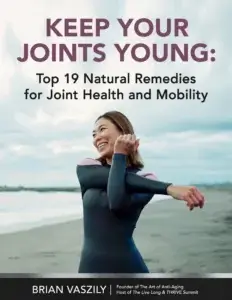
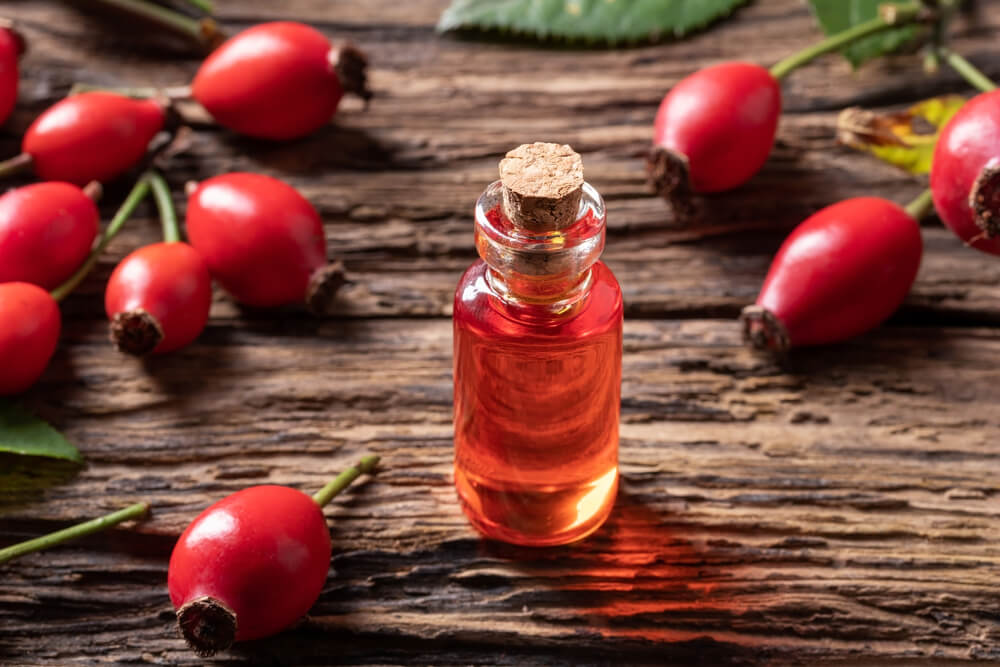
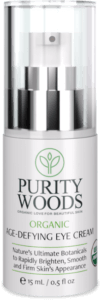
How about rosehip syrup? I gave my children that when they were young but it had high levels of sugar. I don’t even know if it is still for sale in pharmacies here in the UK.
We made our own with honey! Very simple!
Can you share how you made your rose hip syrup?
Is it possible to get the recipe please, I used to get this as a child. Thank you 😊
How did you do this, please?
🌻lynn
In my 80th year I have, since early childhood, have believed in rose hip syrup. My mother used to make it and we loved it! It seemed to have only one drawback in that all those winter-bugs missed our house and we never got sick! As one who truly hated school I would rather be on death’s door than be subjected to such torture. Often we seemed the only kids in school! If only I had then known that our daily regimen of rosehip-syrup was probably responsible I’d have refused to take it!
As a confirmation may I add that a regular bus-driver who complained that his three children coughed their way through every winter until I started to provide him with a large bottle of my homemade remedy. His kids were never sick again (at least in the following four winters he was on that route.
Thanks Tom, I read your comment with a big smile on my face . Really a nuisance to be too healthy sometimes! haha
Hi Tom, can you share the recipe or can I purchase some from you? Love it!
Wow! I have heard people talk about rose hips but never learned what they can do. I need to use them!
Would you share your recipe, please?
good ideas
I do make tea from rosehips already. Wonderful article. So much terrific information. Thank you.
how do u use the rosehips? love to learn how?
Without being very professional, I always collect them, wash them and dry them under the sun or hydrator. Either I grind or pound them or use them whole, I put them in a jar filled with any oil that suits my skin. I normally use coconut or almond oil. I cover the jar and put it away in a dark area for weeks or months. During this time, oil oozes out into the chosen oil which changes to an orange colour. I pour the oil into a dark bottle and start using it. Sometimes you may have to use a seiver to separate oil from the residue. I can top up the of rosehips and oil. I normally use the oil on top of my feet or hands at night. It works! I don’t use it on the face because I suspect the rose bushes have been sprayed with pestcides. I will have to plant them one of these days because a small bottle of rosehip oil can cost about $20.
This is the best sour candy ever. After first frost I just pick few and enjoy the flavor. Seeds are spitted outside. Once I have planted them up in the corner of my garden and now have few extra bushes to snack on. They can be frozen as are or made in to jam or syrup. One other high Vitamin C bush is Seabuckthorn.
This is real new information for me. Thank you so much. I surely have to pay more attention to rosehips.
Really good article
Thank you Brian, you can never learn too much, or you can gain unknown treasures where you least expect. I really enjoy your emails.
I remember nibbling rosehips when visiting cousins in the Newport, R.I., area. Nice to know how healthy they are.
At last some one knows how good rosehips are. It’s been a long time since I have used rosehip oil, thankyou for this report. Going to get the powder and the oil from my health shop. This will benefit me greatly.
I have been using a rose hip oil on my face mixed with a little water for over a year now and it does make a difference. A friend asked another friend of mine if I had a face lift – I couldn’t believe it. So I thought this rose hip must be doing something and I also apply a vitamin C oil daily. I’m 64 and credit this to the oil as I have had many people comment on my skin. Now I want to try the rose hip powder or supplements because of this article. Thank you
Did’nt know much about rosehips
Thanks for the information.
I knew rose hips were good for something so I collected a bag of them from our rose bush. This is the first information I’ve seen on what to do with them. Thank you! BTW, how long do they keep at room temperature?
Wonderful, information-filled, educating article. I have thought a few times about using rosehips for skin, but I use a serum. Can I evade the serum and use tisehios. Or would I still need a serum, as well. What about crepy arms? Is the oil good for that? Didnt the article state that the oil is preferable for skin or the powder/tablet?
Thank you so much for all the info….
Jodi C.
I live in Sweden, and have been harvesting beautiful, big rosehips all week. I cut off the ends, cut the ‘berries’ in half, dig out the seeds (which I sometimes use in baking) with a small tea-spoon, and freeze the berries, to be used all winter in my daily smoothies. Wonderful!
Thank you for a really interesting article!
I collected rose hips one year and made rose hip syrup. Unfortunately too much sugar so will look for another way to do them.
I simmer the berries with enough water to cover for approx. 30-45 minutes. Mash and sieve the berries to remove seeds. With the mixture at a temp of 80-100, no higher, add enough raw honey to sweeten to taste. Raw honey has medicinal qualities. Store in fridge, and freeze what you won’t use within a couple weeks.
Thank you!!
I really enjoyed reading this article. I have known about some of the benefits of rosehip for many years, but there was some additional useful information here. Will certainly consider using it again, especially as it could 😀 act as a tonic for some health issues I am currently experiencing. With many thanks, Cathy.
Wow !! Thank you soo much for the wonderful information I use some rose hip spray and cream – plan to use more .
Very interesting. I love Rosehips. I hope to grow them in the future.
Very interesting, thank you for teaching me. Someday, I’ld like to learn & teach others too. For now, I’m seeking where’s the best school/best teacher-mentor, scholarships or most affordable…🙏
I dug up a ‘wild rose’ thirty years ago and transplanted it in every garden, every time I moved. Was VERY easy to grow and re-grow. Makes many hips, most of which I leave for the winter animals.
Thank you Bryan for your article. It is a full packed of interesting news for me.
I live in Lima, Peru. I will look for rose hips here.
Thank you for this article. We collected beautiful big rosehips from wild bushes growing alongside seamarsh by Dyke Walk/ Bikeway at Terra Nova Rural Park in Richmond, British Columbia 🇨🇦
i have collected rose hips every fall for many years, i use the whole for teas. if i were to want to grind them to powder do you need to remove the inner seeds…i know the little fibers around the seeds can be quite irritating
Very good article thank you.
I used to eat them when I was a child inthe Praries, moved tote city and seldom.see wild roses anymore.dont think I iever knew how beneficial they were. Will look for them in the spring
I’ll look for some Rose Hip tea in our local Community Co-op. Thank you!
This article is rich in nutrients(useful information).Thank you
I am looking for a source for organic rose hips to make tea and cannot find. Any suggestions other than Amazon?
Great article Brian! I have always loved rosehips and the entire rugosa rose bush variety. I will have to plant a lot more on our land.
Glynis
Loved your article, knew some of benefits for I use to make syrup and jam when kids at home and we’d all go out and pick as many buds we could find. Great on pancakes etc. no wonder my kids are so healthy! Now to see where I find some of your products you talked about. Thanks so much for such a loving personal letter.
Thanks for all this info-had no idea. Does anyone have a recipe for the tonic. My 3 grt grandkids needs this-always runny noses.
100% Organic Rosehip Seed Oil is the only thing I put on my face and I have applied it daily for over 25 years now. Everyone comments on how I have little to no wrinkles on my face – I am 54 this week and my face is very soft and plump. I am with you wholeheartedly on this one.
Thank you, I remember as a child I would run into our garden and eat the Rose Petals and the hibiscus flowers. I also loved the Geraldton Wax Flowers and would smell them until I could no longer smell anything else! Also I would rub the leaves between my fingers.
I will look at getting some Rose Hips. I am now in my 70’s and my skin is in need of some boost.
regards,
Ruth
Very informative article on something I have been aware of for years. I took the syrup as a child but in more recent years have used an excellent rise hip seed oil plus a vitamin C waterless serum on my face .. I am nearly 78 and people comment that I look 20 years younger.
Now to collect hips of my rose bushes and turn them into a useful syrup. Thank you
What type of rose bush do you plant and where do you find one that’s organic? Does anyone sell organic rosehip tea, and rosehip powder?
Can you use any rose bush seed?
Knew nothing about rosehips. Have multiple rose bushes in my front yard. Will go out & see about collecting some of them. Can you please advise where to obtain organic rose bushes that will survive an AZ summer or where to obtain the organic oil or powder? Thanks for the informative & interesting article.
Hi, I live in Hereford AZ and I bought 2 dog rose plants from a mail order company in CO called High Country Roses. They were small when I received them but they grew very tall the first year I planted them. This year they bloomed in the Spring with clusters of pink roses. I have just finished harvesting the dark orange red rose hips in September.
Dear brother thank you for this info regarding rose hip very happy to read your report I will start to look for supplement about this magic plant god bless you yours nagi ghobrial